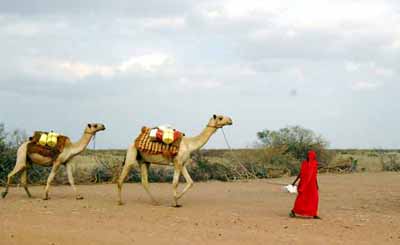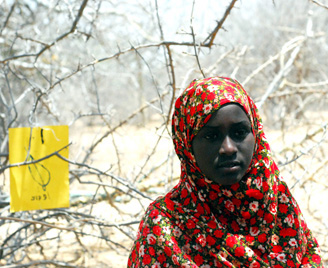Nomadic pastoral communities depend on water and green pastures to maintain their livestock and the worsening conditions pose a drastic threat to their pastoral lifestyle. Many are succumbing to this pressure and "dropping out" of pastoralism, relocating to towns destitute and without work experience. The United Nations Institute for Environmental and Security Studies estimates that by 2010 there will be 50 million such "climate refugees."
Mobile schools – secular pre-schools which follow these groups as they move to find pasture and water for livestock – are an attempt to help nomadic communities develop more options as the climate becomes increasingly hostile. "Security is now seen [by pastoral communities] in children’s education," says Kassim Ali, Chief of Wajir South, a region in
Understandably, the pastoral lifestyle makes accessing mainstream education difficult. Children are constantly moving as families search for pastures and water. While children are taught Islamic Studies for six to seven hours a day in the Islamic school called dugsi, few communities have prioritized – or have access to – secular education.
Supported by two local organizations, Nomadic Heritage Association (NOHA) and Education for Marginalized Children of Kenya (EMACK), mobile schools have drastically changed nomadic communities’ views of secular education. Mobile schools, equipped by a trained pre-school teacher from the community, ensure that children learn the basics of reading, writing and counting in the national languages, Kiswahili and English.
 The existing three mobile schools in the region, first founded in 2005, now host 55 students. Over 30 students have graduated from the mobile school program and are now attending boarding schools in neighboring towns. "We are illiterate, but since schools came we can now read and write. It has been very empowering," says Abdullahi Sheikh Ahmed, chairman of one of the mobile schools.
The existing three mobile schools in the region, first founded in 2005, now host 55 students. Over 30 students have graduated from the mobile school program and are now attending boarding schools in neighboring towns. "We are illiterate, but since schools came we can now read and write. It has been very empowering," says Abdullahi Sheikh Ahmed, chairman of one of the mobile schools.
Farah Olad, EMACK’s Deputy Chief of Party, comes from a community near the Somali border. When he visits the mobile schools, he brings water and biscuits for the children. His concern over the worsening drought is palpable. "I do not think Somalis will ever say they are fed up [with their lifestyle], they would go into a war-torn country to keep going," says Olad, "But, change is complex. Nomadic pastorals are beginning to appreciate what opportunities school brings, such as improving their own livestock, initiating small businesses and lobbying on environmental issues."
"The situation is dehumanizing," says Alex Alusibia, Chief of Party at EMACK, about the drought. He has been working with the Kenyan government to register the schools in a feeding program to ensure that children have regular access to food. He is also lobbying for an emergency food aid component that would be included in every mobile school.

Culture also plays a strong role in limiting children’s access to school. Ebla Abdullahi, a 10-year-old Somali girl, wants to transfer into a boarding school this year and become a teacher. Eventually, she wants to return to her community and teach. However, as tradition dictates, Farah expects that she will be married by the end of the year. When women marry, the other family pays a "bride-price" to her family, making her a valuable tool both economically and socially.
Alusibia says the government has been very responsive and is hoping to deploy the program in
Education offers choice, both economic and cultural. The next generation of young Somali pastoralists will have the potential to work in villages and towns or care for livestock, if not both. Young women will have reason not to marry young and will be able to better provide for their children when they do settle down.
As Olad explains, "It is not about changing culture, but about strengthening it."
***
